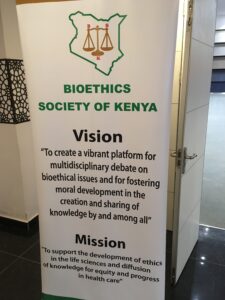 In a recent trip to Kenya, Professor Stuart Rennie visited the capital city of Nairobi with the purpose of participating in and presenting a paper at the 2nd Annual Kenya Bioethics Society conference. The paper was entitled ‘Perceptions of benefit among research participants in Kenya: ethical implications’, and is based on a qualitative research study led by the Kenya Medical Research Institute (KEMRI), Pacific Institute of Research and Evaluation (PIRE), and UNC. The study in Kenya revealed that research participants believed involvement in adolescent HIV research has a number of important benefits apart from any study intervention (i.e. ‘inclusion benefits’); the paper presented focused on the significance of these benefits for ethical assessments of research.
In a recent trip to Kenya, Professor Stuart Rennie visited the capital city of Nairobi with the purpose of participating in and presenting a paper at the 2nd Annual Kenya Bioethics Society conference. The paper was entitled ‘Perceptions of benefit among research participants in Kenya: ethical implications’, and is based on a qualitative research study led by the Kenya Medical Research Institute (KEMRI), Pacific Institute of Research and Evaluation (PIRE), and UNC. The study in Kenya revealed that research participants believed involvement in adolescent HIV research has a number of important benefits apart from any study intervention (i.e. ‘inclusion benefits’); the paper presented focused on the significance of these benefits for ethical assessments of research.
As part of this trip, Professor Rennie worked as consultant for a newly funded National Institute for Health-Fogarty International Center bioethics training grant at KEMRI. Dr. Rennie’s role as consultant was to provide input on design and implementation of the program, as well as curriculum development, based on his experiences in similar Fogarty bioethics projects in the Democratic Republic of Congo, Madagascar and South Africa.
